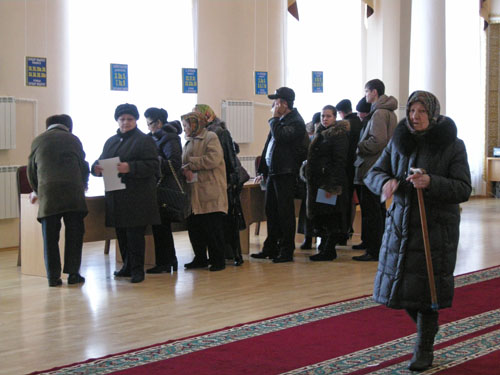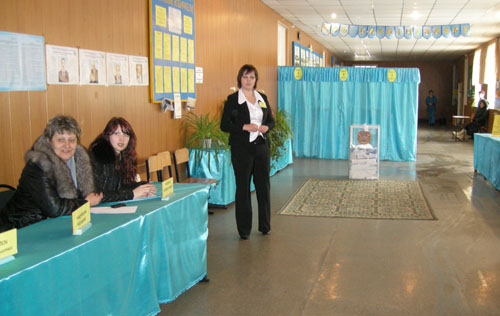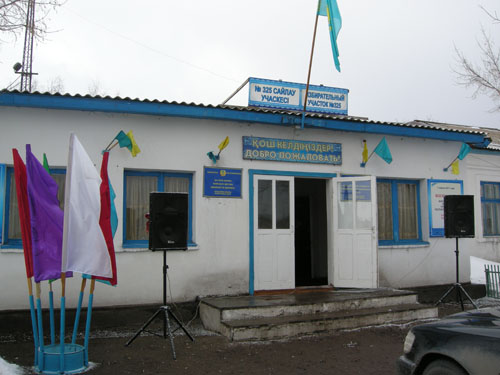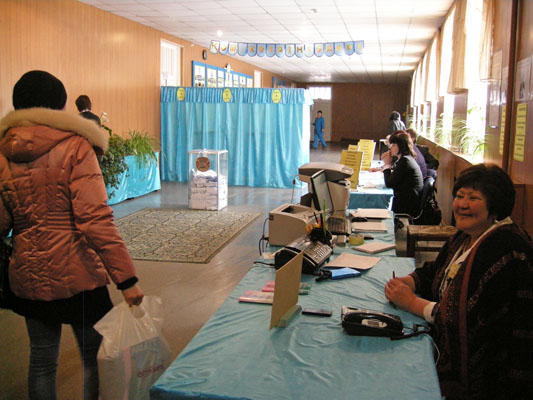Citizens flocked to the polling stations to vote in early presidential elections, which were called for less than two months ago. Elections should have taken place in December 2012, according to the regular schedule. The call for early elections were preceded by a national drive, started in December 2010, to gather signatures to hold a referendum on extending Nazarbayev’s office until 2020. Following international criticism, the proposal for a referendum was scrapped.

The Central Election Commission said the first official results showed the incumbent had won 95.5 percent of the vote on mass turnout of 89.9 percent – both figures beating Nazarbayev’s performance in his last re-election in 2005.
Ahead of the elections, there was little suspense connected to the outcome or the procedural conduct, rather to the turn out. – The lack of a genuine choice between candidates is a disappointment for a country that headed the OSCE only last year, an organization known for its commitment to democratic values and human rights, Engesland stated. In order to ensure some legitimacy, the government campaigned eagerly for people to participate in the elections. – The international community should not accept these elections as expressing the will of the people and clearly demand genuine reform ahead of the upcoming Parliamentary elections, Engesland continued.

In order to run for President, a candidate must pass a tough linguistic test, proving his or her proficiency in the Kazakh language. Criticism arouse that the test was more about a candidate’s political views than a test of his or her grammar and spelling. In addition, the candidate has to gather at least 91 000 signatures from the voters equally represented from all of the country’s 16 regions and deposit a sum of 800 000 tenges (about 5 000 dollars).
For many, these requirements were unattainable. The criteria for the linguistic test were not announced and the tests itself not conducted in public. In the end, only four candidates passed:
- Nursultan Nazarbayev, Nur Otan party, president since 1991 and de facto leader of Kazakhstan since 1989;
- Zhambyl Akhmetbekov, Communist People’s party;
- Gani Kasymov, Party of Patriots;
- Mels Yeleuizov, Tabigat Ecological Union.
The three latter candidates are fairly well-known politicians, but lacking in public support. With only one party in Parliament, the Nur Otan party, it is hard for any potential candidate to develop a strong party base or a distinguished separate political profile.
To demonstrate their disapproval with the snap elections, unregistered opposition parties Alga! and Azzat announced a boycott campaign, together with the opposition Communist party. Some representatives of the civil society, however, encouraged people to participate in the vote no matter the lack of genuine choice. There were campaigns encouraging people to go to the polling station to make sure no one else voted for you, and to make your ballot invalid by crossing out all the candidates as the option “Against all” does not exist.
In Karaganda, the third city in the country after Almaty and Astana, local administration (Akimat) ensured high turnout by sending a fax to heads of all government institutions like schools and hospitals, outlining how and why a 100% turnout of their staff should be obtained by 11 am (The NHC obtained a copy of the letter).

The election campaign was short, and also flawed. There was clear benefit to the incumbent president whose posters, billboards, stickers and flags where easily seen all over the city. Some posters from the other candidates were also seen, moreover in an interestingly similar style.
All candidates had assigned time on TV which they used, and were also screened in the news in a fairly neutral way. Governmental newspapers like Panorama acclaimed the candidates’ campaigns for being “balanced and without black PR”. Not unexpected as one candidate in the beginning of the campaign stated that he did not expect to win, and in fact voted for the President on Election Day. On the day of silence before Election Day, no posters were removed in the cities of Karaganda or Astana.
Kazakhstan chaired the OSCE only last year, flagging efforts in the economic sphere as well as on the road to democracy and a better human rights situation. – These snap elections demonstrate clearly that the expectations that Kazakhstan through the OSCE chairmanship would take another step closer to democracy and implementation of OSCE commitments were not fulfilled, Engesland concluded. – It has been demonstrated that Nazarbayev used the chairmanship as a reward to himself for excellent stewardship and a beginning campaign to sit as Leader of the Nation for a third decade.
There were several speculations on why Nazarbayev opted for early elections, including ensuring that the opposition would have insufficient time to prepare for the elections, and fear that food security problems confronting the government would result in decline in popularity in the near future.
Whatever reason, the conclusion remains that Kazakhstan has yet to fulfill pledges of developing genuine democracy.
—
A Norwegian Helsinki Committee team has been following elections in Kazakhstan, consisting of Bjørn Engesland, Secretary General; Lene Wetteland, Central Asia Program Coordinator; and Parvina Abduvakhobova, Central Asia Program Manager. During Election Day, they visited Astana, Almaty, Karaganda and Osakarovka village.
